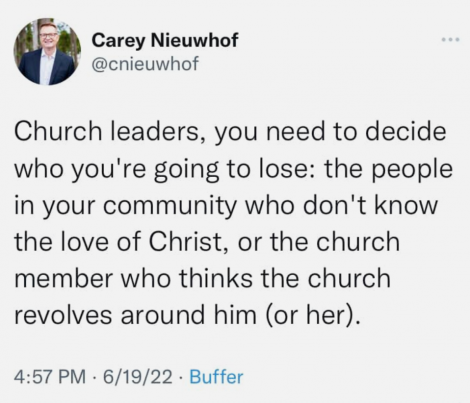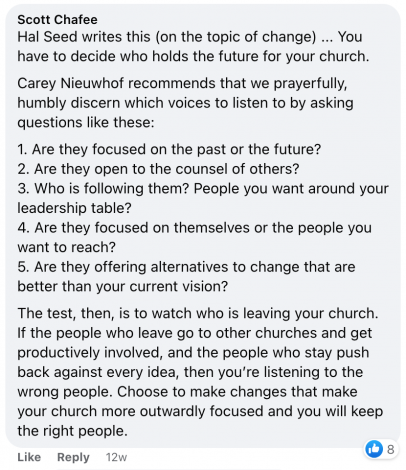This was what I said at the beginning of the quarterly business meeting of King’s Grant Baptist Church in December 2022.

Before I read a Scripture tonight, I want to share something that came from Lynn Hardaway, our Director of Missions with The Bridge Network. I read it on August 9. This is a part of his email series called push to start.
If you feel like walking away from pastoral ministry, you’re not alone. All across the country, as Barna Research pointed out in March 2022, that 22% of pastors have seriously considered quitting full-time ministry. That is up 13% since January 2021. These are tough times to be a leader in any organization, especially in an organization, like the church, that is completely dependent upon the volunteer attendance of its members.
Barna point out three main drivers causing pastors to resign: immense stress, loneliness and isolation, and then the political divisions in the nation. Anecdotally, I would add the lethargy toward the church in the lives of post pandemic Christians and the feral anger and dissatisfaction many are displaying coming out of a two-year lockdown. He goes on to compare these pastors, who have decided to leave the ministry, to Jonah and his call to a specific work. And now we find ourselves in the hold of a ship setting Sail toward Tarshish.
I just wanted you to know that this is happening all across the country, not just here. Barna does his research. Tonight, I want you to know, after being 15 years, that I love this congregation. When Pastor Skip and Dan Cooper met with me that summer before my arrival on Labor Day weekend in 2007, God was opening a door for me to come and serve here, and you affirmed that calling by approving the recommendation of the personnel committee to bring me on staff. So, tonight, I just want you to know that God has not released me from that call.
I realize that we’ve had several things going on with the previous two pastors. Many times when you get badgered and bullied, there comes a certain point when you just asked the question, “why am I still doing this?” But I realize that God has me here for such a time as this, He has some reason. Likely it is to walk with you through this pastoral transition. I don’t know what it is, but my hope is that we can work through whatever is going on to get back to the task and the mission that God has given to us.
That’s why I’ve included those handouts, they are basically clippings from my reading over the last several months, about churches and mission and change, note especially the one about Canoeing the Mountains.
I want to share with you today a Scripture that comes out of Nehemiah’s story. Nehemiah 6:2-9. Dan preached on Nehemiah a couple of weeks back but but when I went back to read the chapter on my own, I had to ask God, “are you saying something to me personally?”
Nehemiah 6:2
Sanballat and Geshem sent a message to me, saying, “Come, let’s meet together at Chephirim in the plain of Ono.” But they were plotting to harm me.
This was reminiscent of the ambush meeting at the home of one of my members. Amy (our children’s minister) and I attended with about 20 people who have proven to be antagonistic to the state of the church and the change that gradually happened over the world-wide pandemic. We thought it would be a conversation to set straight some one the misinformation that has permeated the members, some were outright lies that persist even when third parties have attempted to set the record straight. When it was all over, I thought this verse was appropriate, “they were plotting to harm me.”
Nehemiah 6:3
So I sent messengers to them, saying, “I am doing a great work and am unable to come down. Why should the work stop while I leave it and come down to you?”
Nehemiah tells them that he is doing a good work, and cannot stop this good work to come down to your meeting. That spoke to me. God was telling me to keep my eyes on my calling and to maintain the good work that He has started. Let the church grow in spite of the negativity of a few.
Nehemiah 6:4-5
Then they sent messages to me four times worded in this way, and I answered them with the same wording. 5 Then Sanballat sent his servant to me in the same way a fifth time with an open letter in his hand.
Nehemiah had repeated invitations to meetings and then there was an open letter presented to him. All I could think about was certain members having repeated meetings with my pastor to complain about what they didn’t like, and to belittle his leadership and authority. Then came the infamous 10-page letter of complain, criticism, and bullying.
Nehemiah 6:6-7
In it was written: “It is reported among the nations, and Gashmu says, that you and the Jews intend to rebel; for that reason you are rebuilding the wall. And you are to be their king, according to these reports. 7 You have also appointed prophets to proclaim in Jerusalem concerning you, ‘A king is in Judah!’ And now it will be reported to the king according to these reports. So come now, let’s consult together.”
Nehemiah is accused by the opposition of ulterior motives for his building project. We know while you’re building this wall, according to the report, you plan to be their king. And you even appointed prophets to prophesy in Jerusalem saying there’s a new king of Judah. You know this report will get back to the true king so I suggest that you come to our little meeting.
So much misinformation and outright lies. I never told the PSC to not bring in a potential preacher. 1) All I suggested is that the preacher they bring in should be trained in relational conflict and experienced in transitional pastoral change. The PSC chair pulled the trigger on that one. 2) Who would ever believe that I have enough relational clout to tell “one influential member of the PSC” to do or not do anything? Apparently I quashed one candidate and no amount of truth will change some people’s minds.
There was a false story that I was doing all I could to mold this congregation into a purpose driven church. This means, remove the choir, dress casually, marginalize the older members, and making authoritarian decisions without the congregation voting (referring to the needed change to our schedule in 2021 and then an adjustment in 2022). While I read Rick Warren’s book, I never used a 25-year-old text to architect a takeover of the church.
Nehemiah 6:8-9
Then I sent a message to him saying, “Nothing like these things that you are saying has been done, but you are inventing them in your own mind.” 9 For all of them were trying to frighten us, thinking, “They will become discouraged with the work and it will not be done.” But now, God, strengthen my hands.
Nehemiah’s response is, “you know that you’re lying, you were making this up in your own head.” There is no truth in any part of your story. He adds that the opposition was just trying to intimidate them. They wanted to break their resolve and to stop the good work. so he prayed for strength to continue the work.
When I read this, I was reminded of the noble mission that God has given us, to fulfill the great commission and live out the great commandment. We’ve got to do these if nothing else. We have to remember that whatever we do, no matter what our personal preferences, no matter anything, the mission trumps everything.
Something came to my attention the other day, a text from one of our members, about the city of Chesapeake allowing the Satanic Temple to start a Satan Club in one of their public schools. Imagine that, an after school program in our elementary school called the Satan Club. Like our children need a club influenced by a the father of lies teaching them to be free-thinkers and reject the authority of parents over their lives. As a church, our mission is to be out in our community, to be salt and light, fulfilling the mission that God has given us. This satanic activity is happening because we are not on the front lines. This is happening on our watch, and the city has to let them in the schools, because if they allow the good news club, for fairness, they have to let in all clubs. That’s what we’re up against. This generation is not the same as it was decades ago. We’ve got to be on the cutting edge of challenging and confronting this darkness. That is our mission, and all the things that we are arguing about and all this conflict, is it about the mission?
No, it is a distraction from the mission. It’s about power and control. Who has control Jesus’ church? A few vocal members believe the pastor is a hired hand, saying, “we pay your salary and you work for us.”
We have a lot of people in this congregation who want to be all about the mission. They want to be disciples. They want to grow in their faith. They want to share the gospel. They want to bring new people in, reaching those who are far off from God. I have to admit that it is often hard to bring people in thinking, “what are they going to do when they hear complaining and grumbling coming from our people?” Will they want to stay here? It’s hard to get people to want to be here. When guests come here, they need to hear about the love of Jesus Christ demonstrated through how we treat one another.
So, my thought is this, we are doing a good work here. And that’s what we need to be about, the good work that God has us doing, the mission. We don’t have time for these complaining meetings, we don’t have time for things like that. As Nehemiah says here, we are not going to come down to attend your meeting and to listen to your complaining. We have a task, a noble work of building this wall, and you will not distract us from that noble work. It’s too important.
I see many families, most of whom are at the other end of the hallway, and we see in that area growth and joy and life. That’s where we’re going to invest because we want to raise children and teenagers in the knowledge of the Lord. If we do that, they won’t even be tempted to go to the Satan Club on their school campus. That’s the good work we’re doing, sharing the light and life of the gospel.
So, I invite you to join us on the good work that God, getting the gospel outside the walls of this congregation. If we need to complain about things, we need to go off to the side, rather than making it center stage. we need to protect the flock from the poison that we get from certain members of our congregation. We have to encourage people to stand strong in the Lord and to be about the mission.
I had to share that Scripture with you tonight because God said something to me. Hopefully you will resolve to be all about the mission and not your personal preferences.
Another thing Hardaway writes in his email, I encourage you to stop looking at your situation through your eyes and try to see the church through the eyes of your next pastor. Man, when I saw that, I thought, “would any pastor want to come here?” I can confidently say, “not until we get back to the mission.” That’s what we need to be doing.
* This is the same meeting where we opened the sanctuary early, for 30 minutes of personal prayer, to sit in the sanctuary in silence and pour out our heart to the Lord, confessing sin, and putting all this at the feet of the one who can change hearts and lives.


